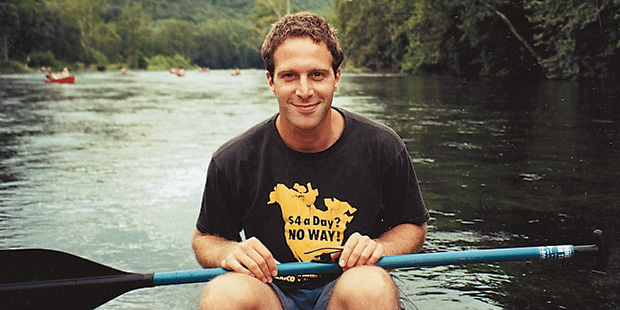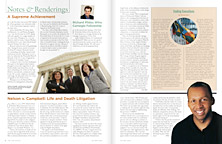Chronicling Drought
Printer Friendly VersionOn a Fulbright scholarship to Brazil in 2000, Nicholas Arons (’04, LL.M. ’05) planned to write articles about the effects of drought. He traveled throughout droughtplagued Northeast Brazil and interviewed local residents. Among his adventures, he made a 150-kilometer pilgrimage to pray for rain, endured a hard-partying adviser who called him “little animal,” and, in one extraordinary incident, was kidnapped at an airport.
But when Arons pitched his juicy stories, he was met with rejection; editors said his writing was too scholarly for popular reading and too anecdotal for the journals. So, he decided to write a book. Almost four years after sending out the first proposals, Waiting for Rain: The Politics and Poetry of Drought in Northeast Brazil will be published in October 2004 by the University of Arizona Press.
Arons spent his law school years editing his 800-page draft of Waiting for Rain. The 250-page book meshes anthropology, history and socio-political analysis to tell the stories of people who have suffered through drought.
Anthropology professor Nancy Scheper-Hughes at the University of California at Berkeley, writes in the foreword: “This book captures the tough spirit of both the region and the author. It tells a story of epic proportions.”
Arons, who learned Portugese at Yale, first went to Brazil as an undergraduate. He immediately took to the laid-back culture that allowed him to “sit, drink coffee, smoke cigarettes and talk to people” all day.
In 2001, Arons began his legal studies at NYU, where he was a Hays Fellow, president of the NYU American Constitution Society and co-founder of the Indigenous Law Society. His first summer, he interned in Geneva at the United Nations High Commissioner for Refugees. Arons hopes to work in public interest law.
With no publicist, Arons has only modest hopes for the book. He would like to see it in classrooms. “Education should be through stories,” he said. “That’s what you remember.” And, of course, he’s hoping to call attention to the plight of people suffering from drought. “Everyone does their little thing,” he said. “Hopefully, this will be mine.”

